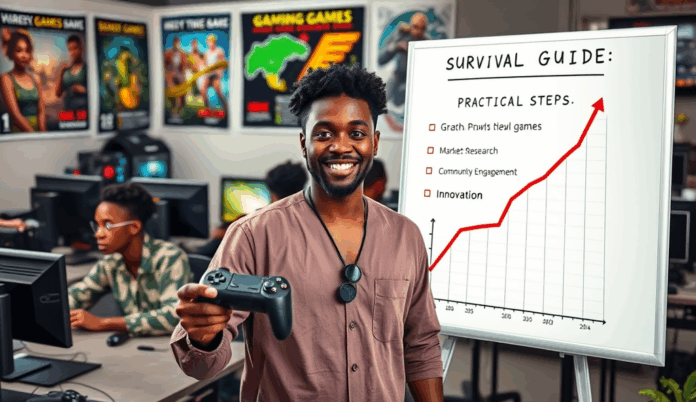Introduction to the Gaming Industry Growth in Nigeria
Nigeria’s gaming industry is experiencing unprecedented expansion, with projections estimating a market value of $126 million by 2025, driven by increasing smartphone penetration and youthful demographics. Local game developers like Maliyo Games are capitalizing on this boom, creating culturally relevant content that resonates with Nigerian players while attracting global attention.
The rise of mobile gaming in Nigeria dominates this growth, accounting for over 70% of the market as affordable internet and cheaper smartphones make gaming accessible nationwide. Esports development in Nigeria is also gaining momentum, with tournaments like the African Esports Championship drawing thousands of participants and spectators across major cities.
This rapid evolution sets the stage for examining how historical trends shaped Nigeria’s current gaming landscape, which we’ll explore next. From traditional board games to digital revolutions, understanding this progression reveals key drivers behind today’s thriving industry.
Key Statistics

Historical Overview of Gaming in Nigeria
Nigeria's gaming industry is experiencing unprecedented expansion with projections estimating a market value of $126 million by 2025 driven by increasing smartphone penetration and youthful demographics.
Nigeria’s gaming roots trace back to traditional board games like Ayo and drafts, which fostered communal interaction before digital adoption in the early 2000s. The arrival of cybercafés introduced PC gaming classics like FIFA and Need for Speed, laying groundwork for today’s esports development in Nigeria.
The mid-2010s marked a turning point as affordable smartphones and mobile data democratized access, accelerating the rise of mobile gaming in Nigeria. Local developers began creating hyper-local titles like “Okada Ride” by Maliyo Games, blending cultural narratives with global gaming mechanics.
This evolution from analog pastimes to digital dominance explains why Nigeria’s gaming market expansion now thrives, setting the stage for examining its current industry dynamics. The next section explores how these historical foundations manifest in today’s ecosystem of startups, tournaments, and investments.
Current State of the Gaming Industry in Nigeria
The rise of mobile gaming in Nigeria dominates this growth accounting for over 70% of the market as affordable internet and cheaper smartphones make gaming accessible nationwide.
Nigeria’s gaming industry now thrives as a $185 million market, driven by mobile gaming adoption and esports tournaments like the African Gaming League. Startups like Maliyo Games and Gamr continue to push hyper-local content, while international titles like PUBG Mobile dominate player engagement.
The rise of mobile gaming in Nigeria accounts for 85% of revenue, with over 60 million gamers actively participating monthly. Lagos has emerged as a hub for gaming startups, hosting incubators like NG_Hub to nurture local talent and innovation.
This rapid expansion sets the stage for deeper exploration of growth drivers, from infrastructure improvements to youth-focused investments. The next section examines how these elements converge to fuel Nigeria’s digital entertainment boom.
Key Drivers of Gaming Industry Growth in Nigeria
Nigeria’s gaming industry now thrives as a $185 million market driven by mobile gaming adoption and esports tournaments like the African Gaming League.
Nigeria’s gaming market expansion stems from improved mobile internet penetration, with 4G coverage reaching 72% of urban areas and affordable data plans enabling 60 million monthly gamers. Local game developers like Maliyo Games capitalize on this by creating culturally relevant titles, while esports development thrives through tournaments like the African Gaming League, attracting sponsorships and youth engagement.
Government-backed initiatives such as NG_Hub in Lagos foster gaming startups by providing funding, mentorship, and infrastructure development for emerging talent. International investors are also recognizing Nigeria’s potential, with venture capital flowing into platforms like Gamr, which connects gamers and organizes competitive events.
This blend of local innovation and global interest propels the digital entertainment boom.
The rise of mobile gaming in Nigeria is further fueled by smartphone affordability, with devices under $150 dominating 65% of the market. As hyper-local content gains traction alongside global hits like PUBG Mobile, the next section explores the platforms and trends shaping player preferences.
Popular Gaming Platforms and Trends in Nigeria
Mobile gaming dominates Nigeria’s digital entertainment landscape with 85% of gamers accessing titles like PUBG Mobile and Call of Duty: Mobile through Android devices priced below $150.
Mobile gaming dominates Nigeria’s digital entertainment landscape, with 85% of gamers accessing titles like PUBG Mobile and Call of Duty: Mobile through Android devices priced below $150. Hyper-local platforms like Maliyo Games’ “Okada Ride” blend traditional Nigerian themes with casual gameplay, resonating with 40% of users who prefer culturally relevant content.
Esports platforms such as Gamr and African Gaming League are gaining traction, hosting tournaments that attract over 10,000 monthly participants and partnerships with brands like MTN. Live-streaming on YouTube and Twitch has surged, with Nigerian creators like “Papa Oyin” amassing 500,000 subscribers by showcasing competitive gameplay and local tournaments.
The rise of play-to-earn games like Axie Infinity reflects Nigeria’s growing interest in blockchain gaming, despite connectivity challenges. As these trends evolve, the next section examines infrastructural and regulatory hurdles impacting the industry’s growth.
Challenges Facing the Gaming Industry in Nigeria
Nigeria’s gaming industry is poised for exponential growth with projections estimating the market could surpass $300 million by 2027 driven by mobile gaming and esports.
Despite the rapid growth of mobile gaming and esports, Nigeria’s gaming industry faces infrastructural hurdles like unstable electricity and limited broadband penetration, with only 48% of the population having internet access. High data costs further restrict gameplay, particularly for blockchain-based titles like Axie Infinity, despite their rising popularity.
Regulatory uncertainty also poses risks, as unclear policies around digital payments and cryptocurrency create barriers for play-to-earn models and developer monetization. Local studios like Maliyo Games often navigate funding gaps, with less than 15% of gaming startups securing venture capital due to investor skepticism.
Additionally, piracy remains rampant, with 60% of gamers accessing cracked versions of premium titles, undercutting revenue for developers. However, these challenges present opportunities for innovation, as explored in the next section on solutions for Nigerian gamers and developers.
Opportunities for Nigerian Gamers and Developers
Despite infrastructural challenges, Nigeria’s gaming industry offers untapped potential, with mobile gaming revenue projected to hit $70 million by 2025, driven by Africa’s largest youth population. Local developers like Maliyo Games are creating hyper-casual titles tailored for low-bandwidth users, proving innovation thrives within constraints.
The rise of esports development in Nigeria presents earning opportunities, with tournaments like the African Esports Championship offering $50,000 prize pools. Blockchain gaming also enables play-to-earn models, allowing gamers to monetize skills despite regulatory uncertainties around cryptocurrency.
Piracy challenges have spurred subscription-based models, as seen with GDM Arena’s affordable mobile gaming passes. These adaptations highlight how Nigeria’s gaming market expansion relies on localized solutions, setting the stage for deeper public-private collaborations discussed next.
Government and Private Sector Support for Gaming in Nigeria
Recognizing the gaming industry’s economic potential, Nigeria’s government has initiated partnerships like the National Information Technology Development Agency’s (NITDA) collaboration with Lagos State to support local game developers through funding and training programs. Private investors are also fueling growth, with platforms like Carry1st securing $20 million to expand African gaming ecosystems, including Nigeria’s booming mobile gaming market.
Telecom giants like MTN and Airtel have contributed by sponsoring esports tournaments and improving internet infrastructure, addressing connectivity barriers highlighted earlier. Startups such as Maliyo Games have benefited from grants and incubator programs, demonstrating how public-private synergy can accelerate Nigeria’s gaming market expansion despite piracy and regulatory hurdles.
These efforts lay a foundation for sustainable growth, paving the way for discussions on future prospects, including emerging technologies and untapped opportunities in Nigeria’s gaming landscape.
Future Prospects of the Gaming Industry in Nigeria
Building on current momentum, Nigeria’s gaming industry is poised for exponential growth, with projections estimating the market could surpass $300 million by 2027, driven by mobile gaming and esports. Emerging technologies like blockchain and VR are gaining traction, with startups like Kuluya exploring play-to-earn models tailored to Nigeria’s youth-dominated demographic.
Public-private partnerships, as seen with NITDA and Lagos State, will likely expand, fostering more incubators for local game developers like Maliyo Games. Improved internet infrastructure from telecom providers such as MTN and Airtel could further reduce connectivity barriers, unlocking rural gaming markets.
The rise of localized content and monetization strategies, including in-game ads and subscriptions, presents untapped opportunities for Nigerian developers. As investor interest grows, Nigeria’s gaming ecosystem could become a blueprint for Africa’s digital entertainment boom, setting the stage for broader economic impact.
Conclusion on the Gaming Industry Growth in Nigeria
Nigeria’s gaming industry has shown remarkable growth, with mobile gaming leading the charge as smartphone penetration reaches 50% nationwide. Local developers like Maliyo Games and Gamr are creating culturally relevant content, proving the potential of Nigeria’s digital entertainment boom.
The rise of esports tournaments like the African Gaming League and increased investment in gaming startups highlight the sector’s expanding opportunities. With youth engagement at an all-time high, Nigeria is poised to become Africa’s gaming hub.
As infrastructure improves and more investors recognize the market’s potential, the industry’s trajectory points toward sustained expansion. This growth presents exciting prospects for gamers, developers, and entrepreneurs alike in Nigeria’s evolving digital landscape.
Frequently Asked Questions
How can Nigerian gamers monetize their skills in the growing gaming industry?
Participate in esports tournaments like African Gaming League or explore play-to-earn games like Axie Infinity to earn rewards.
What affordable tools can help Nigerian gamers overcome poor internet connectivity?
Use data-saving apps like Opera Mini and offline modes in games like PUBG Mobile Lite to reduce bandwidth usage.
Where can Nigerian gamers find locally relevant games to support the industry's growth?
Download hyper-local titles like Maliyo Games' Okada Ride from Google Play Store to enjoy culturally themed gameplay.
How can Nigerian gamers protect themselves from piracy risks in the gaming market?
Stick to official app stores and verified platforms like Gamr to avoid cracked versions that may contain malware.
What opportunities exist for Nigerian gamers to join the industry professionally?
Apply for training programs at NG_Hub or join startups like Maliyo Games to build careers in game development and esports.


